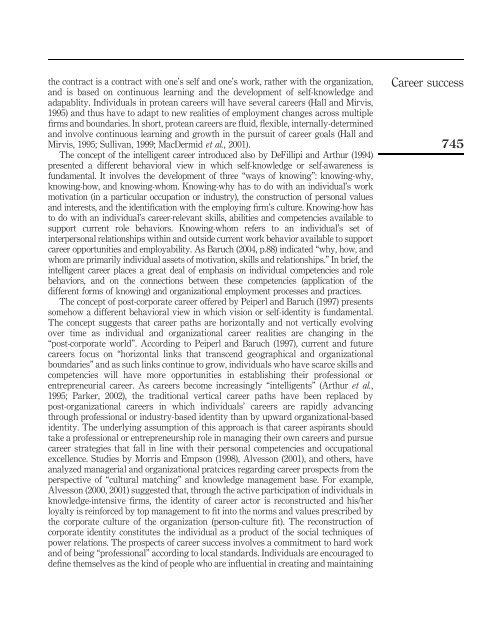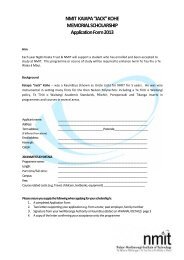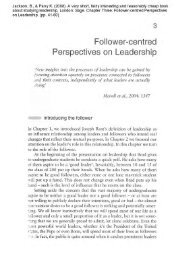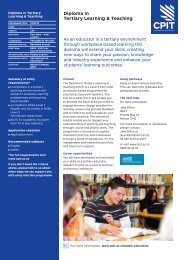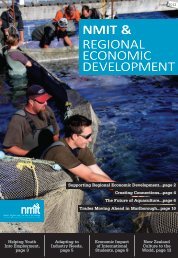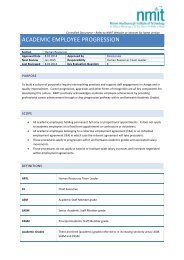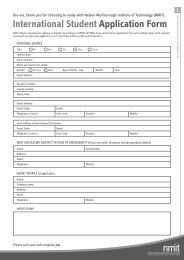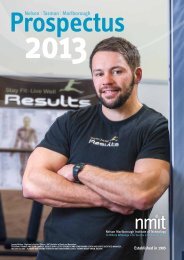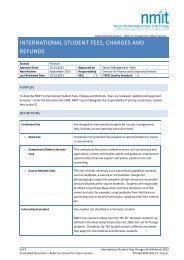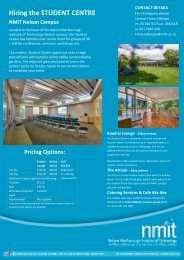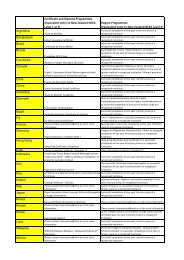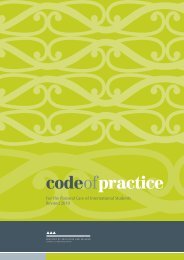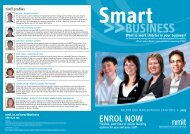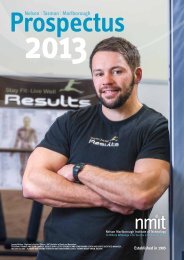Career success - 2007.pdf
Career success - 2007.pdf
Career success - 2007.pdf
Create successful ePaper yourself
Turn your PDF publications into a flip-book with our unique Google optimized e-Paper software.
the contract is a contract with one’s self and one’s work, rather with the organization,and is based on continuous learning and the development of self-knowledge andadapablity. Individuals in protean careers will have several careers (Hall and Mirvis,1995) and thus have to adapt to new realities of employment changes across multiplefirms and boundaries. In short, protean careers are fluid, flexible, internally-determinedand involve continuous learning and growth in the pursuit of career goals (Hall andMirvis, 1995; Sullivan, 1999; MacDermid et al., 2001).The concept of the intelligent career introduced also by DeFillipi and Arthur (1994)presented a different behavioral view in which self-knowledge or self-awareness isfundamental. It involves the development of three “ways of knowing”: knowing-why,knowing-how, and knowing-whom. Knowing-why has to do with an individual’s workmotivation (in a particular occupation or industry), the construction of personal valuesand interests, and the identification with the employing firm’s culture. Knowing-how hasto do with an individual’s career-relevant skills, abilities and competencies available tosupport current role behaviors. Knowing-whom refers to an individual’s set ofinterpersonal relationships within and outside current work behavior available to supportcareer opportunities and employability. As Baruch (2004, p.88) indicated “why, how, andwhom are primarily individual assets of motivation, skills and relationships.” In brief, theintelligent career places a great deal of emphasis on individual competencies and rolebehaviors, and on the connections between these competencies (application of thedifferent forms of knowing) and organizational employment processes and practices.The concept of post-corporate career offered by Peiperl and Baruch (1997) presentssomehow a different behavioral view in which vision or self-identity is fundamental.The concept suggests that career paths are horizontally and not vertically evolvingover time as individual and organizational career realities are changing in the“post-corporate world”. According to Peiperl and Baruch (1997), current and futurecareers focus on “horizontal links that transcend geographical and organizationalboundaries” and as such links continue to grow, individuals who have scarce skills andcompetencies will have more opportunities in establishing their professional orentrepreneurial career. As careers become increasingly “intelligents” (Arthur et al.,1995; Parker, 2002), the traditional vertical career paths have been replaced bypost-organizational careers in which individuals’ careers are rapidly advancingthrough professional or industry-based identity than by upward organizational-basedidentity. The underlying assumption of this approach is that career aspirants shouldtake a professional or entrepreneurship role in managing their own careers and pursuecareer strategies that fall in line with their personal competencies and occupationalexcellence. Studies by Morris and Empson (1998), Alvesson (2001), and others, haveanalyzed managerial and organizational pratcices regarding career prospects from theperspective of “cultural matching” and knowledge management base. For example,Alvesson (2000, 2001) suggested that, through the active participation of individuals inknowledge-intensive firms, the identity of career actor is reconstructed and his/herloyalty is reinforced by top management to fit into the norms and values prescribed bythe corporate culture of the organization (person-culture fit). The reconstruction ofcorporate identity constitutes the individual as a product of the social techniques ofpower relations. The prospects of career <strong>success</strong> involves a commitment to hard workand of being “professional” according to local standards. Individuals are encouraged todefine themselves as the kind of people who are influential in creating and maintaining<strong>Career</strong> <strong>success</strong>745


